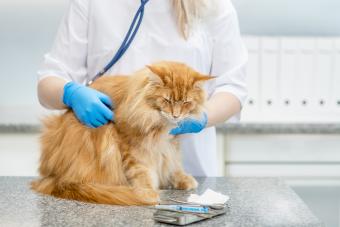
As a registered veterinary nurse, I’ve seen the worst of the worst cases. Anytime my own pets get sick, my mind reaches for all the potential things that could be wrong. So when my 6-year-old cat, Lily, started losing weight and developed smelly diarrhea, I created a laundry list of possible diagnoses: worms, food allergies, and hyperthyroidism, among others. I prepared myself for a massive bill and meds to give at home. What I wasn’t prepared for was a cancer diagnosis. Yet that’s exactly what I received.
Lily had small-cell intestinal lymphoma, which is the most common cancer seen in cats. Fortunately, the prognosis is really good. Cats live an average of 18 to 30 months (1.5 to 2.5 years) with treatment. Even though the at-home treatment plan might feel overwhelming at first, I promise it’s more doable than you think. Lily fought her cancer for almost exactly two years before I had to say goodbye, and I learned a lot of tips and lessons along the way.
How I Treated My Cat for Intestinal Lymphoma
After I got over the initial shock of her diagnosis (which took a while), I went into full-blown nurse mode. “OK, so what can we do to help her?” I asked Lily’s veterinarian. And, fortunately, the answer was a lot. Intestinal cancer in cats isn’t curable, but there are plenty of ways to keep it under control and give a pet a great quality of life.

Oral Chemotherapy
I get it. The word “chemo” can sound totally intimidating. Unlike when people receive chemo, most pets don’t get sick at all or have just mild side effects. The great news about small-cell intestinal lymphoma is that it’s one of the cancers that doesn’t require injectable chemotherapy.
Instead, I was able to give Lily her chemo by mouth. She was prescribed chlorambucil, and I needed to give her a dose twice a week. When I got the first bottle, I was shocked to see just how big the capsules were. “There is absolutely no way she’ll eat this in a Pill Pocket,” I thought. But I was wrong, and to my surprise, she gobbled it right up.
Oral Steroids
In general, the best course of action for treating small-cell intestinal lymphoma is a combination of oral steroids and chemotherapy. Because every cat I’ve ever known has done better with liquid medications instead of pills, I had the steroid compounded into a tasty (or so I thought) tuna-flavored suspension. It was expensive, but I figured it would be worth it.
After several weeks of chasing my sick little cat around the house and wiping dribbles of medicine off her chin, neck, and sometimes my walls, I was about ready to throw in the towel. She hated it, but I think I hated it more. So I finally decided to try a different form of the same steroid and hid a small pill inside a Pill Pocket. She ate it right away.
Anti-Nausea Medication
Lily was never one of those pukey cats (you know, the one who vomits if you look at them sideways), but I could tell she was nauseated toward the end. My vet prescribed Cerenia, which is an anti-nausea medication that also has analgesic properties to help with belly pain. I could tell it made her a lot more comfortable.
Regular Bloodwork
While the steroids and chemo are fighting the intestinal cancer cells, they can also have a negative impact on other body systems. I had to bring Lily into the hospital for routine bloodwork every couple of months. We checked CBCs (complete blood counts) to make sure her white blood cells didn’t get too low from the chemo and ran chemistry panels to monitor organ function and check her glucose.
The life expectancy of a cat with small cell intestinal lymphoma is 1.5 to 2.5 years with appropriate treatment.
Things to Keep in Mind Throughout Treatment
The treatment protocol for this disease isn’t just a one-and-done kind of thing. It’s something I needed to continue indefinitely and reevaluate as needed to keep the cancer under control while also keeping Lily comfortable. But, as with any long-term medication, problems can always pop up. And believe me, they did.
- Steroids impair the immune system. The biggest thing to be mindful of is that long-term steroid use can put your little one at risk for infections. Lily developed a few UTIs over her two-year treatment, along with ulcers on her eyes. The fur on her belly also never fully grew back from her initial ultrasound.
- Steroids make them ravenous. A healthy appetite is a great thing for a cat with intestinal lymphoma, but be aware that steroids make cats absolutely ravenous. Lily tried to eat anything and everything she could get her paws on. Fortunately, she didn’t swallow a hair tie or something dangerous like that, but I was always a little worried she might.
- Handle chemo with care. Chemotherapy drugs can pose a risk to pet owners, so I had to wear a fresh pair of gloves every time I handled the capsules and/or gave them to Lily.
- Work with them, not against them. As I mentioned, Lily did a lot better with steroid tablets rather than the liquid. Every cat is different, and if I could do it over, I would have tried all the different medication forms right off the bat. But you live, and you learn, so I hope you can learn from my mistake.
Saying Goodbye to Lily
Despite the few hiccups we encountered along the way, Lily did fantastic with her treatment. She was back to her chubby, playful self in no time, and I was taking advantage of every extra second I had with her. So when my final few weeks with Lily arrived, I knew they were the last.
The weight she’d put back on after starting the treatment was slowly melting off of her, and her fur began to look a little unkempt. The decision of when to say goodbye to a pet is a very personal one, and I still wonder if I did it too late or too soon. But I do know that I’m so grateful for the additional years I got with Lily, thanks to her treatment and incredible veterinary team.







